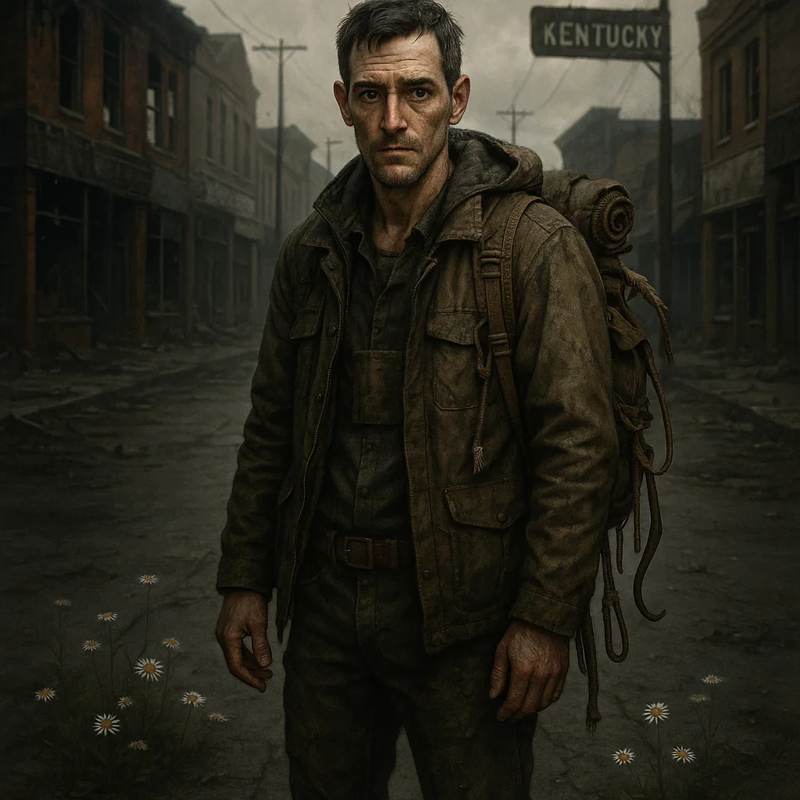Linzell Murroy
He/Him
30 years old
Typical
105 kg
Personality
Linzell Murroy is a reserved and pragmattic man, shaped by years of loss and moving from place to place. He values caution and quiet watching more then rushing into decisions. He tends to keep people at arm’s lenght, not because he dislikes them but out of a deep fear of loosing anyone close again. Still, once he does trust someone, he’s loyal almost to a fault, and will put himself in danger for the few companions he allows into his circle. Violence isnt something he seeks, but he has learned to face it without much hesitation when survival really demands it. His way of handling conflict is more practical than emotional; if talking or distance can work he will try that, but if cornered he strikes fast and without wasting time. Years on the road made him skeptical of authority, often reluctant to follow blindly, though he knows sometimes cooperation is the only way. Beneath the hard exterior, Linzell carries a quiet determinaton to keep moving, believing that endurance and adapting are the only things left that truly matter.
Appearance
Linzell is a tall, lean man in his early 30s, his frame wiry from years of hard work and traveling rather then any formal training. His dark hair is usualy unkept and kept short just for practicity, with streaks of grey showing earlier then most people his age. His skin looks weatherd from spending long days outside, with faint scars on his hands and arms that hint at both hard labor and past fights. His eyes, a dull hazel, carry a watchful, wary look that rarely stays on one place for long. He wears layered, practical clothes scavanged over the years—sturdy boots, worn jackets, whatever he can get to stay protected from the weather—always utility before looks. He doesnt realy stand out in a crowd, but the quiet intensity in his posture and the way he keeps scanning around makes it clear he lived too long in dangerous places to ever fully relax.
Background
Linzell Murroy was born in 1981 in a small town at Kentucky. His father was working as carpenter, and his mother spend most of her days helping at the local church. Money was always tight, but his childhood was steady enough—long afternoons wandering the woods behind their house, quiet nights with books, and the simple rutines of a working family. He wasn’t the loudest kid in a group, mostly watching more than talking, but he had a quiet curiosity about the world.
In 1999, when Linzell was twelve, everything chaged. At first people though the coughing and fevers were only allergies, but soon the daisies took hold and claimed both of his parents. Left alone in the house, Linzell spent the first terrifying weeks trying to survie. He pushed furnitures againts the doors to keep looters out, collected rainwater in pots from the roof, and rationed the little food left in the pantry one meal at a time. Nights where the worst—listening to coughs echo down the street, neighbors screaming as the sick started turning. When a family from next door came urging him to leave, he hesistated, clinging to the only home he ever knew. In the end he made the choice: staying meant certain death, so he followed them. That family became his protectors during the dangerous months that followed, taking him along as they moved between settlements and quarantine zones. Without their guidance he would not have survived the journeys.
Life inside the quarentine zones was harsh but teached him quick. He learned when to stay quiet, when to move, and how to survive with little. Through the 2000s he drifted between failing QZs and small survivor groups, every collapse forcing him to start over. He worked where he could—carrying wood, guarding fences, hauling food—and slowly hardened into someone who could take losses without breaking apart. By his late teens he attached himself to an independent trade caravan, moving between settlements, exchanging goods and finding paths others would avoid. It was dangerous, full of raiders, sickness and infected, but it gave him the tools he needed to live.
By 2011, Linzell reached Knox County with that caravan. Weary from years on the road but still standing, he carried the memory of his parents and all those he lost after. Still, he keeps walking, guided by the belief that survival comes from being resilient and adapting. He rarely lets people close, but hasn’t abandoned trust completly. In a world where betrayal is common and nothing last too long, he searches for one place where maybe, he can finaly stop running.
